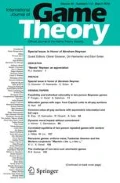Abstract
Consider a family of zero-sum games indexed by a parameter that determines each player’s payoff function and feasible strategies. Our first main result characterizes continuity assumptions on the payoffs and the constraint correspondence such that the equilibrium value and strategies depend continuously and upper hemicontinuously (respectively) on the parameter. This characterization uses two topologies in order to overcome a topological tension that arises when players’ strategy sets are infinite-dimensional. Our second main result is an application to Bayesian zero-sum games in which each player’s information is viewed as a parameter. We model each player’s information as a sub-σ-field, so that it determines her feasible strategies: those that are measurable with respect to the player’s information. We thereby characterize conditions under which the equilibrium value and strategies depend continuously and upper hemicontinuously (respectively) on each player’s information.
Similar content being viewed by others
References
Aliprantis CD, Border KC (1999) Infinite dimensional analysis: a Hitchhiker’s guide, 2nd edn. Springer-Verlag, Berlin
Allen B (1983) Neighboring information and distribution of agents’ characteristics under uncertainty. J Math Econ 12: 63–101
Balder EJ, Yannelis NC (1993) On the continuity of expected utility. Econ Theory 3: 625–643
Berge C (1963) Topological spaces. Oliver and Boyd, Edinburgh
Bewley T (1972) Existence of equilibria in economies with infinitely many commodities. J Econ Theory 4: 514–540
Boylan E (1971) Equiconvergence of martingales. Ann Math Stat 42: 552–559
Cotter K (1986) Similarity of information and behavior with a pointwise convergence topology. J Math Econ 15: 25–38
Cotter K (1987) Convergence of information, random variables and noise. J Math Econ 16: 39–51
Cotter KD (1994) Type-correlated equilibria for games with payoff uncertainty. Econ Theory 4: 617–627
Dudley RM (2002) Real analysis and probability, 2nd edn. Cambridge University Press, Cambridge
Einy E, Haimanko O, Moreno D, Shitovitz B (2008) Uniform continuity of the value of zero-sum games with differential information. Math Oper Res 33: 552–560
Horsley A, Van Zandt T, Wrobel A (1998) Berge’s maximum theorem with two topologies on actions. Econ Lett 61: 285–291
Kajii A, Morris S (1997) The robustness of equilibria to incomplete information. Econometrica 65(6): 1283–1309
Kajii A, Morris S (1998) Payoff continuity in incomplete information games. J Econ Theory 82(1): 267–276
Landers D, Rogge L (1986) An inequality for the Hausdorff-metric of sigma-fields. Ann Prob 14: 724–730
Milgrom P, Weber R (1985) Distributional strategies for games with incomplete information. Math Oper Res 10: 619–632
Monderer D, Samet D (1996) Proximity of information in games with incomplete information. Math Oper Res 21: 707–725
Rogge L (1974) Uniform inequalities for conditional expectations. Ann Prob 2: 486–489
Sion M (1958) On general minimax theorems. Pac J Math 8: 171–176
Van Zandt T (1993) The Hausdorff metric of σ-fields and the value of information. Ann Prob 21: 161–167
Van Zandt T (2002) Information, measurability and continuous behavior. J Math Econ 38: 293–309
Author information
Authors and Affiliations
Corresponding author
Rights and permissions
About this article
Cite this article
Van Zandt, T., Zhang, K. A theorem of the maximin and applications to Bayesian zero-sum games. Int J Game Theory 40, 289–308 (2011). https://doi.org/10.1007/s00182-010-0242-x
Accepted:
Published:
Issue Date:
DOI: https://doi.org/10.1007/s00182-010-0242-x



